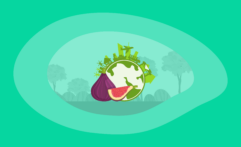10 Most Sustainable Sock Brands: The Conscious Consumer’s Guide
Affiliate Disclosure
Hey fellow impactful ninja ?
You may have noticed that Impactful Ninja is all about providing helpful information to make a positive impact on the world and society. And that we love to link back to where we found all the information for each of our posts.
Most of these links are informational-based for you to check out their primary sources with one click.
But some of these links are so-called "affiliate links" to products that we recommend.
Why do we add these product links?
First and foremost, because we believe that they add value to you. For example, when we wrote a post about the environmental impact of long showers, we came across an EPA recommendation to use WaterSense showerheads. So we linked to where you can find them. Or, for many of our posts, we also link to our favorite books on that topic so that you can get a much more holistic overview than one single blog post could provide.
And when there is an affiliate program for these products, we sign up for it. For example, as Amazon Associates, we earn from qualifying purchases.
What do these affiliate links mean for you?
First, and most importantly, we still only recommend products that we believe add value for you.
When you buy something through one of our affiliate links, we may earn a small commission - but at no additional costs to you.
And when you buy something through a link that is not an affiliate link, we won’t receive any commission but we’ll still be happy to have helped you.
What do these affiliate links mean for us?
When we find products that we believe add value to you and the seller has an affiliate program, we sign up for it.
When you buy something through one of our affiliate links, we may earn a small commission (at no extra costs to you).
And at this point in time, all money is reinvested in sharing the most helpful content with you. This includes all operating costs for running this site and the content creation itself.
What does this mean for me personally?
You may have noticed by the way Impactful Ninja is operated that money is not the driving factor behind it. It is a passion project of mine and I love to share helpful information with you to make a positive impact on the world and society. However, it's a project in that I invest a lot of time and also quite some money.
Eventually, my dream is to one day turn this passion project into my full-time job and provide even more helpful information. But that's still a long time to go.
Stay impactful,
Amid growing concerns about the textile industry’s environmental impact, there is pressure to find greener clothes for your wardrobe, from special occasion dresses to everyday socks. Unfortunately, fashion greenwashing makes it harder for you and all other consumers to figure out which clothing brands offer the most eco-friendly garments. So, we had to ask: Which are the most sustainable sock brands?
The most sustainable sock brands are Conscious Step, Arvin Goods, and Harvest & Mill, which prioritize organic fabrics, employ full traceability, and strive for circularity. In addition, KOMODO and Happy Earth Apparel reduce carbon emissions and adhere to ethical manufacturing.
Whether you are searching for the perfect pair of socks for everyday comfort or outdoor activities to add to your wardrobe without negatively impacting the soil, the water, the animals, and other people, there is a brand for you. So, let’s keep reading to learn more about the most sustainable sock brands and how they ensure sustainable, ethical practices.
Here’s How We Selected the Most Sustainable Sock Brands
Socks are everyday small garments whose sustainability can be easily overlooked. Yet, they can have significant environmental impacts because of the large amount of socks bought and thrown away year in, year out.
“Sustainable: The ability to be maintained at a certain rate or level | Avoidance of the depletion of natural resources in order to maintain an ecological balance”
Oxford Dictionary
The brands on this list were chosen based on their commitment and actions to promote sustainable practices while reducing the environmental impacts of the textile industry.
They are transparent about their materials, processes, and workforce management within their supply chain.
Some brands focus their efforts on reducing waste and optimizing natural resources while others strive to reduce the carbon footprint of their clothes.
All of these brands share the commitment to reshape the textile industry toward a more sustainable and Earth-friendly sector.
These Are the 10 Most Sustainable Sock Brands
Most Sustainable Sock Brands
Overall, these sock brands are sustainable. Yet, they take various approaches to reduce environmental impacts and uphold ethical standards. Let’s dive into each brand and find out more.
Conscious Step: Organic Cotton Socks Free of GMOs, Pesticides, and Insecticides


“We’re embracing slow fashion with quality that’s made to last and designs that outlive trends. For us, buying better beats buying more.”
Conscious Step
🌎
How do they ensure their sustainability?
Conscious Step ensures sustainability by using a high proportion of eco-friendly materials, including organic cotton. Their socks are made with cotton from organic farms in India, which is non-GMO, pesticide- and insecticide-free. Their organic cotton fabrics have certifications from Fairtrade and the Global Organic Textile Standard (GOTS). Additionally, Conscious Step lowers the environmental impact of their materials by sourcing recycled polyester and recycled nylon instead of virgin synthetic fabrics in some textile products.
🌐
How do they ensure their ethics?
Conscious Step commits to fair and transparent working conditions. They ensure payment of a living wage in most of their supply chain and also monitor health and safety issues through a third-party audit of their manufacturing partners. They also audit most of their supply chain and trace all of their suppliers.
🤝
Are they part of any giving-back programs?
Conscious Step is a member of 1% for the planet, pledging at least 1% of annual sales to environmental solutions for a healthy planet. Every Conscious Step purchase supports one of their partner organizations and the communities they serve. So far, they have donated $1,121,917 to various causes to restore the oceans, educate kids, save animals, etc.
🛍️
What is their product range?
- Best for: kidswear, menswear, womenswear
- Product range: socks, sweatshirts, plus-size
- Price range: $$$
- Size range: XXS–XXL
Arvin Goods: Sustainable Socks With a Commitment to Transparency

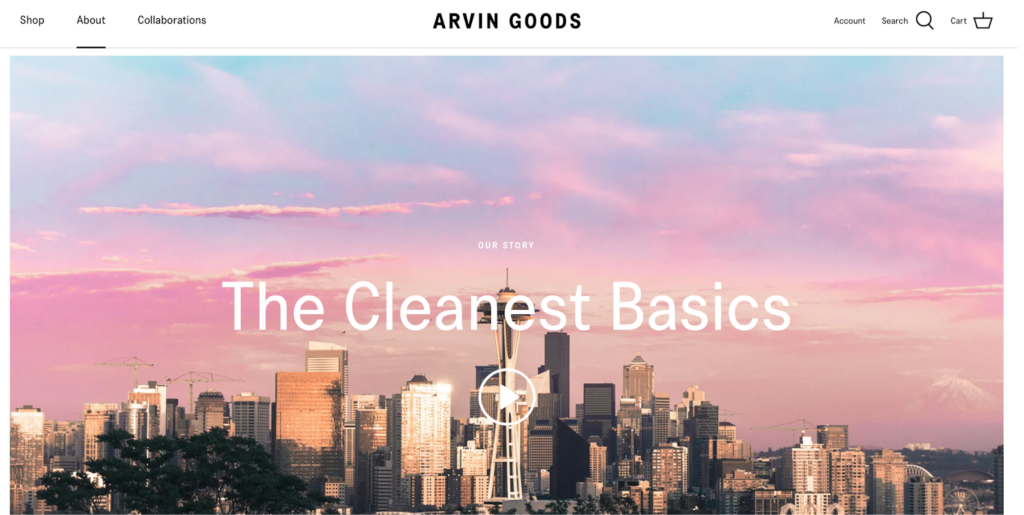
“We foster and lead impact reduction by making low-impact basics that never compromise on performance, comfort, quality — or ethics.”
Arvin Goods
🌎
How do they ensure their sustainability?
Arvin Goods ensures sustainability by focusing on recycling and upcycling materials to close the textile loop. They use recycled cotton, which they recover from textile scraps, to make comfortable and fitting socks. Other recycled fabrics used in Arvin Goods’ products are hemp biofiber (recycled hemp), recycled wool, recycled polyester, and recycled nylon. They are also certified by the Global Recycled Standard (GRS). Their “Take Back Bag” is a convenient solution for recycling and giving new purpose to used clothes. Additionally, their products are dyed according to the Plant Dye Standard, which increases energy efficiency. Arvin Goods produces some of their products in a factory that runs on 50% solar power. Finally, Arvin Goods uses responsible packaging, including a recycled and recyclable card wrap for socks, along with durable, recycled paper outer packaging from EcoEnclose EcoX Mailers.
🌐
How do they ensure their ethics?
Arvin Goods is transparent about their manufacturing locations and practices. They source their recycled cotton base yarn from a facility in Spain and manufacture the end products in one factory in Portugal and another in Canada. These locations have relatively high standards for labor safety. Arvin Goods is also GOTS and GRS certified, both of which ensure traceability in their supply chain.
🤝
Are they part of any giving-back programs?
Arvin Goods is not known to be part of any giving-back programs.
🛍️
What is their product range?
- Best for: womenswear, menswear
- Product range: socks, T-shirts, sweatshirts, hoodies, accessories
- Price range: $$
- Size range: S–XXL
Harvest & Mill: Carbon-Neutral Apparel Made in Organic and Traceable US-Based Supply Chain
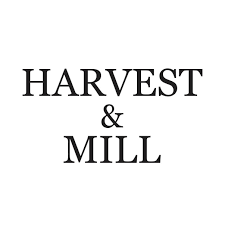
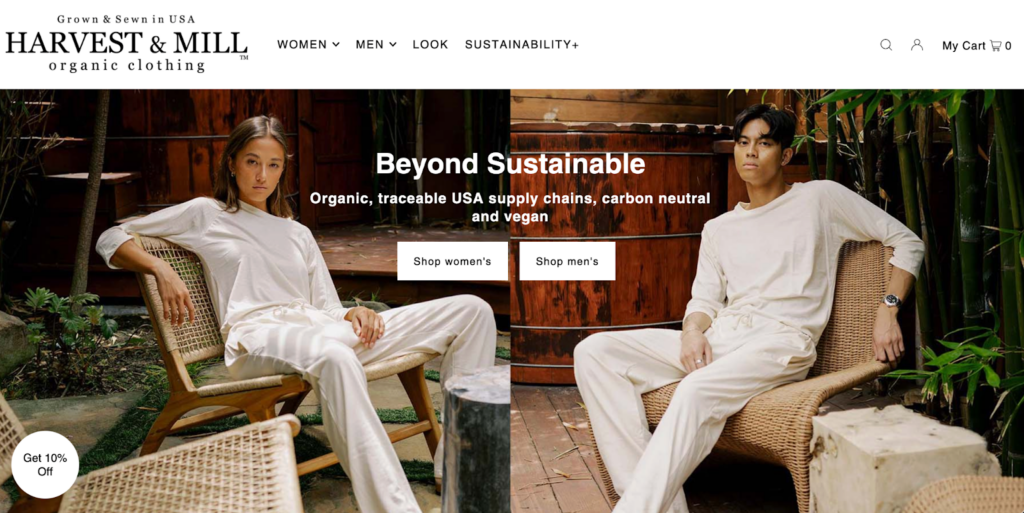
“We use zero fabric wholesalers or brokers and we use only 100% USA grown organic cotton yarns – because that is the only way to have true transparency in fashion and fabric chemical content.”
Harvest & Mill
🌎
How do they ensure their sustainability?
Harvest & Mill’s sustainability efforts focus on using low-impact materials, minimizing textile waste, and achieving carbon neutrality. Firstly, they source eco-friendly materials, from fibers to dyestuff to packaging. Harvest & Mill sources a high proportion of organic cotton, grown and milled in the US, for their socks, bottoms, and tops. They also opt for low-impact, natural, and non-toxic dyestuff for some of their apparel while eliminating dyes altogether for the Harvest & Mill’s Sock Collection, Organic Heirloom Brown Collection, and all their natural-white joggers and tops. Regarding packaging and shipping, Harvest & Mills uses plastic-free, reusable, recyclable, and easily compostable materials. Secondly, they minimize textile waste by designing patterns that reduce off-cuts while repurposing or recycling all extra fabrics. Lastly, they achieve carbon neutrality by reducing and offsetting their emissions. They hold their supply chain entirely in the US, shortening the transporting distances (by five times). Additionally, they offset all their carbon emissions, including production, supply chain transportation, office operation, and all orders they ship out.
🌐
How do they ensure their ethics?
Harvest & Mill traces their whole supply chain and visits their suppliers regularly. They state that from the farm workers to the factory workers, everyone who works on Harvest & Mill clothing receives a fair wage, safe working conditions, the legally protected right to organize, and protection from discrimination.
🤝
Are they part of any giving-back programs?
Harvest & Mill is a member of Fibershed, a nonprofit that develops regional fiber systems that build soil and protect the health of Earth’s biosystems.
🛍️
What is their product range?
- Best for: womenswear, menswear
- Product range: shirts, T-shirts, pants, shorts, socks
- Price range: $$$
- Size range: S–XL
Komodo: An Ethical Brand Since 1988


“We are passionate about protecting and nurturing our planet, but we also love fashion and don’t believe the two need to be mutually exclusive.”
Komodo
🌎
How do they ensure their sustainability?
Komodo ensures sustainability by sourcing eco-friendly materials for their clothing items and using renewable energy for their production. Firstly, they use a medium proportion of eco-friendly materials, including organic cotton certified by the Global Organic Textile Standard (GOTS), linen, hemp, TENCELTM, and recycled synthetic fabrics. Specifically, their unisex socks are made mostly with organic cotton (90%) and some recycled nylon for durability. Regarding packaging material, Komono has removed single-use plastic from their supply chain, a commitment they decided on in 2019. Further down the life-cycle in the manufacturing stage, they use renewable energy to reduce their climate impact. Lastly, they partner with OMNI to facilitate the selling and buying of Komodo’s pre-loved items, striving toward circulating clothes and reducing waste.
🌐
How do they ensure their ethics?
Komodo has a Code of Conduct that covers all of the ILO’s Fundamental Principles and Rights at Work. They trace most of their supply chain and visit their suppliers regularly. Additionally, the majority of factories they use are audited according to GOTS or SEDEX.
🤝
Are they part of any giving-back programs?
As a member of 1% for the Planet, Komono commits to donating one percent of their sales to the Sumatran Orangutan Society, which works to restore natural rainforests and ecosystems through purchasing and repurposing palm oil plantations. They have also donated to various charities and social projects, including, but not limited to, Tibet Relief Fund, Sunrise Orphanage Kathmandu, Water for Africa, and Inspirasia Foundation.
🛍️
What is their product range?
- Best for: womenswear, menswear
- Product range: tops, T-shirts, shirts, dresses, sweaters, coats, jackets, jumpsuits, dungarees, skirts, denim, pajamas, socks, shoes, bags, accessories
- Price range: $$
- Size range: S–XL
Happy Earth Apparel: Earth-First Organic Clothing Brand


“We’re not cool with compromise when it’s at the expense of our world. We’ll find a good way to do something, or we won’t do it.”
Happy Earth Apparel
🌎
How do they ensure their sustainability?
Happy Earth Apparel ensures sustainability by sourcing sustainable and organic textile materials, using recycled and recyclable packaging, and reducing waste. Firstly, Happy Earth Apparel uses a high proportion of organic cotton. For example, their organic sock collection is made with organic cotton with a small percentage of recycled nylon and elastane to enhance flexibility and moisture-wicking performance. Secondly, they use 100% post-consumer, recycled plastic to make durable packaging bags that can be recycled again. Also, these bags are lightweight, cutting down on transporting emissions and costs. Lastly, Happy Earth Apparel has waste-reduction incentives regarding plastic (shipping in bulk), water (wastewater recycling and rain harvesting), and textile (low-waste cutting techniques). Furthermore, Happy Earth Apparel is Climate Neutral certified for reducing and offsetting their emissions. They also use solar energy in their supply chain to reduce their carbon emissions. Regarding emissions that can’t be avoided, they offset in clean energy projects in the US, Uganda, India, and China. These include providing energy-efficient stoves, capturing methane, and installing biodigesters in rural homes that convert manure waste into gas for cooking.
🌐
How do they ensure their ethics?
Happy Earth Apparel ensures their ethics by binding suppliers with a Code of Conduct covering four of ILO’s Fundamental Principles and Rights at Work. Additionally, over 95% of their products are made in Fairtrade-certified factories, while part of their final production stage is certified by Worldwide Responsible Accredited Production (WRAP). Finally, Happy Earth Apparel traces most of their supply chain.
🤝
Are they part of any giving-back programs?
Happy Earth Apparel actively participates in giving-back programs. As a member of 1% for the Planet, Happy Earth Apparel is committed to donating a minimum of 1% of their revenue to charitable organizations through their Tree Planting, Climate Change, and Trash Clean-Up projects. For example, consumers can choose to plant five trees for every purchase.
🛍️
What is their product range?
- Best for: womenswear, menswear
- Product range: shirts, T-shirts, sweatshirts, hoodies, jackets, bottoms, dresses, pants, leggings, shorts, socks, accessories
- Price range: $$
- Size range: XXS–XXL
Tentree: A Lifestyle Clothing Brand That Plants Trees for Every Item Purchased

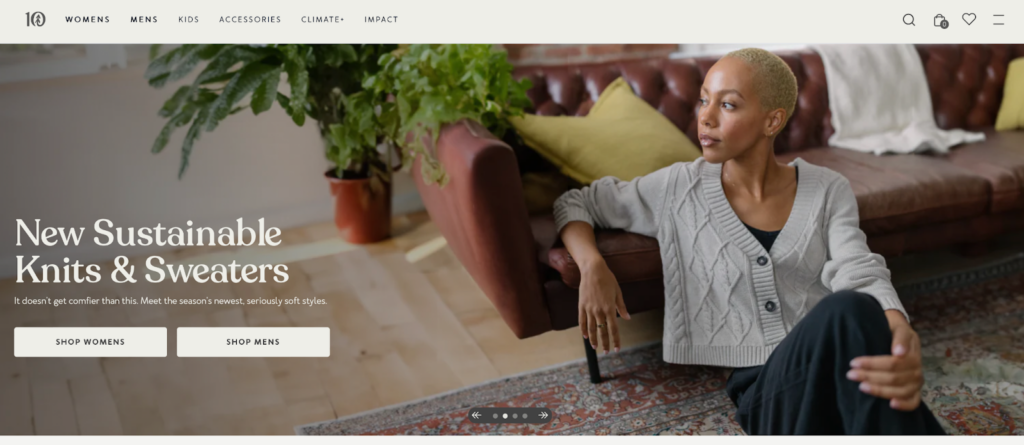
“ We believe the future of business is restorative.”
Tentree
🌎
How do they ensure their sustainability?
Tentree ensures sustainability by planting trees, promoting circularity, opting for low-impact fabrics, and attaining responsible packaging. Since their inception, they have planted more than 100,000,000 trees, which helps regenerate ecosystems, capture carbon, and provide forestry jobs in communities around the world. Together with textile recycler SuperCircle and resale guru Treet, Tentree has created an integrated solution to resell or recycle pre-loved Tentree clothing items, keeping them in circulation and out of landfills. Tentree also uses eco-friendly fabrics and blends, including organic cotton, hemp, recycled polyester, and TENCEL™. Specifically, their eco-friendly socks are made with organic cotton and recycled polyester. Regarding packaging, they replaced all single-use plastics with FSC-certified and 100% recycled paper. Finally, they have B Corporation and Climate Neutral certifications.
🌐
How do they ensure their ethics?
Tentree enforces fair labor practices by collaborating only with manufacturers and suppliers that guarantee a safe and respectful environment for their employees. They regularly audit their partner facilities to ensure compliance with their Code of Conduct and international labor standards. Part of their supply chains is certified by organizations that protect workers, such as Fair Wear Foundation, Global Organic Textile Standard, Sedex Members Ethical Trade Audit, and Worldwide Responsible Accredited Production – WRAP. Additionally, Tentree commits to protecting forests through their paper, packaging, and fabric choices.
🤝
Are they part of any giving-back programs?
Giving back is a cornerstone of Tentree’s mission. Tentree plants 10 trees worldwide for every item purchased, contributing to reforestation and combating climate change. In 2022 alone, their customers helped plant over 22 million trees across nine countries, restoring over 2,000 hectares of terrestrial forests, over 1,000 hectares of coastal mangrove forests, and hundreds of hectares of marine land.
🛍️
What is their product range?
- Best for: kidswear, menswear, womenswear
- Product range: T-shirts, tank tops, shirts, sweaters, cardigans, dresses, pants, hoodies, dresses, shorts, skirts, joggers, jackets, coats, underwear
- Price range: $$
- Size range: XXS–XXL
Organic Basics: A Carbon Neutral Brand Creating Underwear, Activewear, and Everyday Essentials

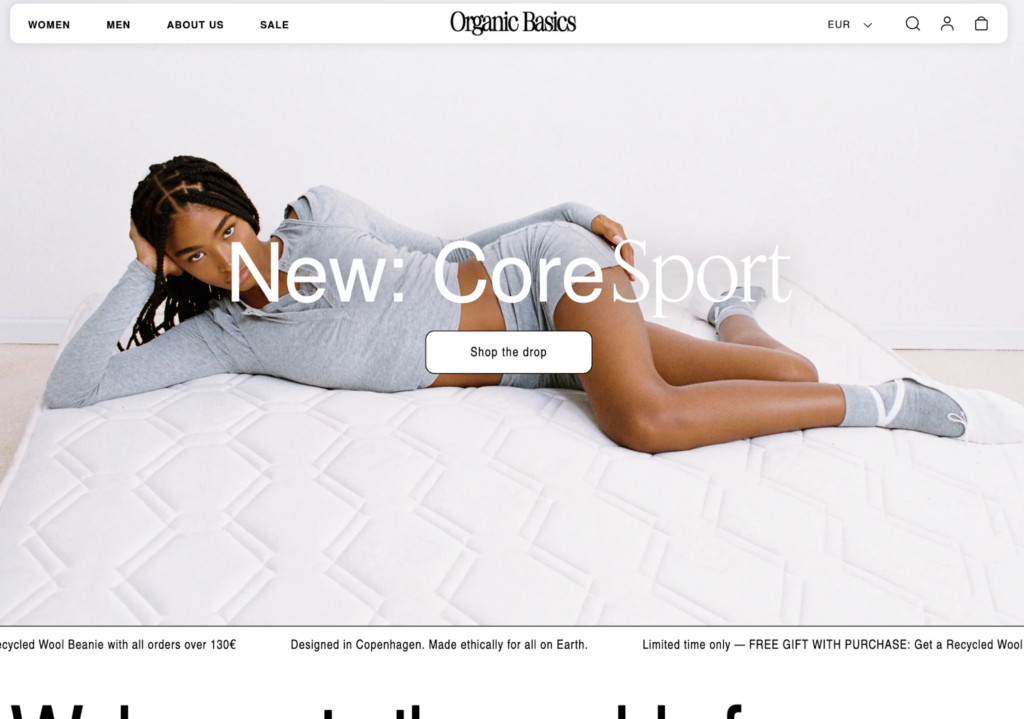
“We make our basics to be both Earth- and people-friendly — carefully choosing materials and fabrics that care for our environment, only partnering with factories that consider their impact too, and designing all the basics for all bodies.”
Organic Basics
🌎
How do they ensure their sustainability?
Organic Basics promotes sustainability by choosing fabrics based on their environmental footprint and lifetime durability. Their clothes are made exclusively with natural fabrics (organic cotton certified by the Global Organic Textile Standard), low-impact textiles (TENCEL™ lyocell certified by the STANDARD 100 by OEKO-TEX®), or recycled materials (recycled nylon certified by the Global Recycling Standard). They use a small percentage of elastane (spandex) in some garments, such as socks, to extend the products’ longevity, which ultimately extends the lifespan. Organic Basics is fully transparent about the impact of their products, enabling consumers to understand their share in using the clothes. Organic Basics partners with Made2Flow, which calculates their emissions, and One Carbon World, which helps them reduce and offset all their emissions. Finally, they are also a B Corporation.
🌐
How do they ensure their ethics?
Organic Basics works only with trusted, certified factory partners, who ensure that their workplace is free of child labor and forced labor and that their workers enjoy a safe working space, earn a living wage, and benefit from employee perks like free lunches and childcare. They show full transparency of the location and practices in their factories. Organic Basics also audits or visits most of their suppliers.
🤝
Are they part of any giving-back programs?
Organic Basics donates 1% of the value of all orders to sustainable projects. Their partnership with Beam Impact enables consumers to choose where their 1% donation will go, at no extra cost to the consumers, to support local charities that help Nature Conservation, Ocean Conservation, Rewilding, or Sustainability & Gender Equity.
🛍️
What is their product range?
- Best for: womenswear, menswear
- Product range: underwear, bras, bottoms, T-shirts, tops, sweatshirts, hoodies, knitwear dresses, swimwear, socks, plus-size
- Price range: $$$
- Size range: XXS–XXL
Woron: Comfortable Underwear and Socks Made Sustainably
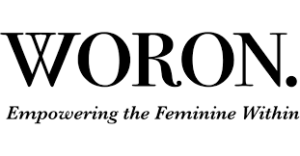
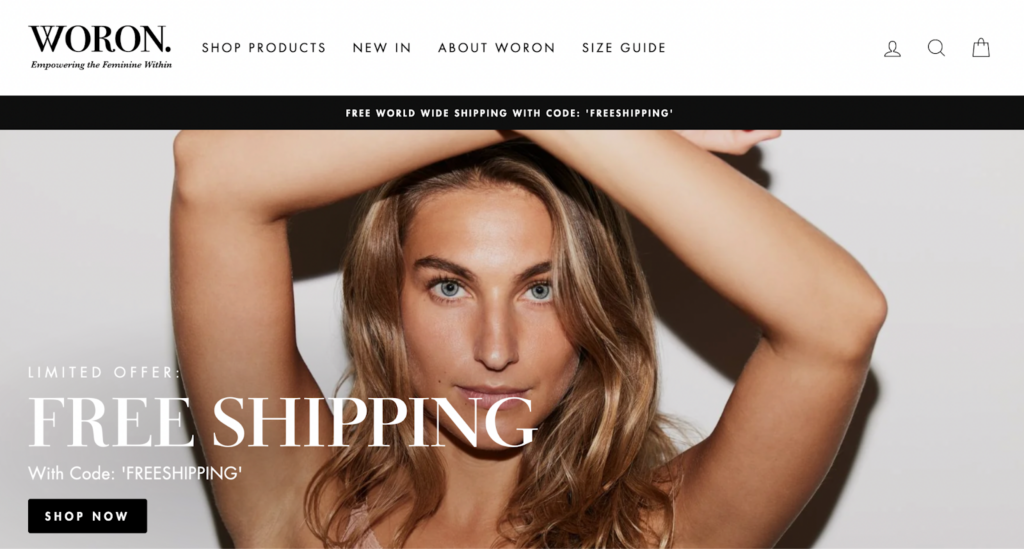
“At the core of everything we do at Woron is a strong respect for the people we work with and the environment we work within. We are well aware of the reputation of the fashion industry and strive to promote positive change.”
Woron
🌎
How do they ensure their sustainability?
Woron ensures sustainability by sourcing a medium proportion of eco-friendly materials for their bras, panties, and socks. They prioritize cellulose fibers derived from plants, including GOTS-certified organic cotton and beech-based modal by Lenzing. Also, they exclusively opt for recycled nylon, specifically ECONYL® fibers, for components like lace and mesh to reduce their environmental impacts. Furthermore, they don’t use any harmful chemicals and toxic dyes. Their bras are free of metal pokes. Lastly, Woron operates on limited production runs to minimize textile waste.
🌐
How do they ensure their ethics?
Woron maintains ethics by disclosing their Europe-based manufacturing partners (located in Hungary, Greece, Italy, and Turkey). For example, their socks are made in a small family-owned business in Italy.
🤝
Are they part of any giving-back programs?
Woron is not known to be part of any giving-back programs.
🛍️
What is their product range?
- Best for: womenswear
- Product range: bras, underwear, loungewear, socks
- Price range: $$$
- Size range: XS–XL
Allbirds: Simple and Comfortable Footwear Made With Nature-Based Materials

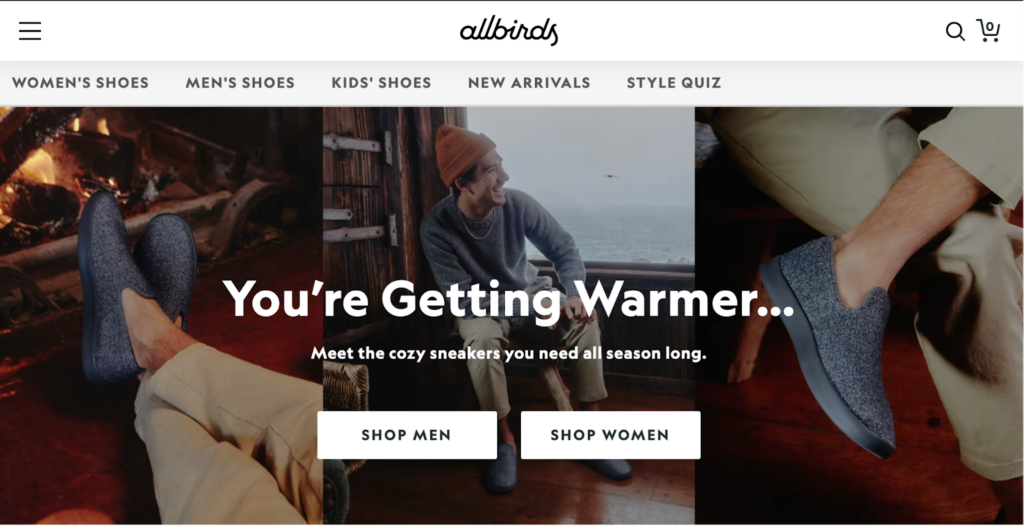
“Reducing the carbon footprint of our products is at the heart of everything we do.”
Allbirds
🌎
How do they ensure their sustainability?
Allbirds ensures sustainability by committing to a concrete plan to achieve net zero carbon by 2030 through meticulously measuring their carbon footprint and working to reduce the emissions beyond carbon neutrality while offsetting the current emissions to operate as a carbon-neutral business. They rely on renewable materials, regenerative agriculture, and responsible energy to reduce their carbon footprint. Specifically, Allbirds sources natural and recycled fabrics to replace petroleum-based synthetic textile materials. The brand even invented their own nature-based alternative called SweetFoam®, their shoe sole material derived from the world’s first carbon-negative green EVA (ethylene-vinyl acetate). They’ve also invested in novel solutions, like Plant Leather, a 100% natural, plant-based leather. Additionally, more than 60% of their merino wool currently comes from regenerative agriculture, which has the potential to reverse climate change while promoting biodiversity. Specifically, they combine natural and plant-based fabrics (merino wool, organic cotton, TENCEL™) with recycled synthetic fabrics in their socks. Further down the life-cycle, Allbirds actively reduces their carbon footprint in manufacturing and transporting by using renewable energy in their “owned & operated” facilities and their finished goods manufacturers, shipping by boats, and reducing 40% packaging material by using one post-consumer recycled cardboard as a 2-in-1 shoe box/shipping box. In spring 2024, Allbirds plans to launch M0.0NSHOT—a net zero carbon shoe (a standard sneaker has an average footprint of about 14 kg CO2 eq). Lastly, they encourage buying and selling slightly imperfect and gently used Allbirds products on Allbirds ReRun™ to extend the products’ life-cycle.
🌐
How do they ensure their ethics?
Allbirds has a Supplier Code of Conduct, drawing upon ILO Core Labor Standards to ensure safe working conditions, respect and dignity for workers, and environmentally responsible manufacturing processes in Allbirds’ supply chain. They require independent, third-party social and environmental audits of their Tier 1 suppliers. They also strive for transparency and traceability in their supply chain: 100% of their Tier 1 and Tier 2 suppliers are currently mapped with a target to reach 100% supply chain traceability by 2025. Additionally, their Animal Welfare Policy ensures their merino wool is held to high farming standards, land management, and animal welfare. Their merino wool is also certified by ZQ Merino, covering sustainability and ethics from farm to fashion.
🤝
Are they part of any giving-back programs?
Allbirds donates slightly used shoes returned by customers to Soles4Souls, an organization that helps to empower people living in poverty by creating jobs for them. During the COVID-19 pandemic, Allbirds supported healthcare workers by donating shoes and running a “buy one, give one” option, enabling customers to get involved and show appreciation for those making a difference.
🛍️
What is their product range?
- Best for: womenswear, menswear, kidswear
- Product range: shoes, socks
- Price range: $$
- Size range: XS–XXL
Pact: Stylish, Comfortable, Essential Clothing Made Ethically and Sustainably


“We believe the planet, and the people on it, should always come first in fashion.”
Pact
🌎
How do they ensure their sustainability?
Pact ensures sustainability by using low-impact textile and packaging materials, offsetting the carbon impact of all their products, and facilitating the donation of used clothes to reduce waste. They use a high proportion of eco-friendly fabrics, including organic fabrics made with GOTS-certified cotton. Specifically, their sock collection is made with organic cotton and is carbon neutral. Additionally, their clothes are delivered in the VelaTM paper bags. These bags are made with carbon-neutral, FSC-certified, recyclable paper. Pact also partners up with SimpliZero. This partnership enables measuring the impact of every product Pact makes and offsetting it through reforestation, renewable energy, and community projects sequestering carbon from the atmosphere. Their Give Back Box incentive enables their customers to reuse the boxes their pact orders came in and donate their used clothes to local charities with the postal fee paid for by Pact.
🌐
How do they ensure their ethics?
Pact uses Fair Trade CertifiedTM factories, providing safe working conditions, community support, and additional development funds to workers in their supply chain. They trace most of their supply chain, including the final stage of production.
🤝
Are they part of any giving-back programs?
Pact is not known to be part of any giving-back programs.
🛍️
What is their product range?
- Best for: womenswear, menswear
- Product range: dresses, hoodies, sweatshirts, activewear, sleepwear, maternity wear, T-shirts, underwear, jumpsuits, playsuits, plus-size
- Price range: $$$
- Size range: XS–XXXL
Why Is It Important to Buy Products Made of More Sustainable Fabrics
It is important to buy products made of more sustainable fabrics because a sustainable textile industry has a lower carbon footprint, helps save natural resources, and is better for forests, animals, and humans.
Buying Sustainable Fabrics Reduces Your Carbon Footprint
The production of clothing and footwear is estimated to contribute 10% of global greenhouse gas emissions—more than all international flights and shipping combined. If the fashion industry were a country, it would be the fourth largest emitter of carbon dioxide.
One way to reduce the carbon footprint of the clothes you buy is to opt for sustainable fabrics. Sustainable fabrics, which are often made with natural or recycled fibers, have relatively low carbon footprints compared to petroleum-based fabrics. For example, organic cotton made in the US has a carbon footprint of 2.35 kg CO2 (per ton of spun fiber)—a quarter of polyester’s carbon footprint.
Buying Sustainable Fabrics Reduces Demand For Natural Resources and Waste Management
The textile industry uses water and land to grow cotton and other fibers. It is estimated that 79 billion cubic meters of water were used for the sector worldwide in 2015. For example, producing a single cotton t-shirt requires as much water as one person drinks for 2.5 years (2,700 liters of fresh water).
Worse yet, the textile economy is vastly more linear than circular: the largest amount of resources used in clothes ended up in landfill (instead of being recycled to remake clothes). According to a report by the Ellen MacArthur Foundation,
- Less than 3% of materials used in the textile economy in 2015 came from recycled sources.
- In other words, more than 97% of resources used in making clothes are newly extracted.
When clothing items are disposed of within a short period of time—under a year in the case of half of the fast fashion clothes—the natural systems that provide raw materials for fabrics don’t have enough time to recover and regenerate, which could lead to ecological breakdown.
Sustainable fabrics are made with less water and emissions while lasting longer:
- Because they are durable, you don’t need to buy new clothes too often.
- Thus, you help reduce the pressure to extract more resources for making new items.
Similarly, making and consuming sustainable fabrics made with recycled materials reduces the demand for virgin materials while helping tackle waste management.
Buying Sustainable Fabrics Encourages Sustainable Management of Forests
Sustainable plant-based fabrics are made with raw materials from forests and plantations that are sustainably managed, such as complying with FSC standards.
When you buy sustainable plant-based fabrics, you discourage unsustainable forestry practices like illegal logging. You can help reduce deforestation, biodiversity loss, and the effects of climate change.
Buying Sustainable Fabrics Encourages Fairer Treatment of Animals
The fashion industry is rife with animal mistreatment when it comes to making animal-based fabrics like wool or silk. Every year, billions of animals suffer and die for clothing and accessories.
Buying sustainable vegan alternatives can help to reduce the pressure on raising more and more animals to meet the demand for animal-based fabrics while sacrificing their well-being and lives.
Suppose you have to buy fabrics made with, for example, wool or silk; make sure you only choose brands committed to cruelty-free products. In that case, you help advocate better treatments for animals raised within the textile industry.
Using Sustainable Fabrics Encourages Fairer Treatment of Textile Workers
Recent statistics from UNICEF estimated as many as 170 million child laborers worldwide, many of whom were engaged in some form of work in the textile industry. They don’t get paid minimum wages and often work long hours.
When you buy sustainable fabrics from brands transparent about the working conditions at their factories, you discourage the use of child labor and help promote better working conditions for textile workers.
How Can You Generally Buy More Sustainable Fabrics
The key to sustainably buying fabrics is to check on relevant environmental and original certifications.
For natural fabrics:
- Global Organic Textile Standard (GOTS): A globally recognized certification system that ensures a certain threshold of organic content has been met. It covers manufacturing, packaging, labeling, transportation, and distribution (but not what happens in the fields where crops are grown).
- USDA Certified Biobased Product: The USDA BioPreferred® Certification is a voluntary certification offered by the United States Department of Agriculture. The certification identifies products made from plants or other renewable materials.
- Ecolabel: Ecolabel is the official European Union voluntary label recognized worldwide for certified products with a guaranteed, independently verified low environmental impact. The label requires high environmental standards throughout the entire life-cycle: from raw material extraction through production and distribution to disposal. It also encourages companies to develop innovative, durable, easy-to-repair, and recyclable products.
For plant-based semi-natural/semi-synthetic fabrics:
- Forest Stewardship Council: An FSC certification ensures that the wood (or wood-like material) comes from responsibly managed forests that provide environmental, social, and economic benefits.
There are two types of FSC Certification:- FSC Forest Management Certification, with a focus on the origin of the wood—the forest.
- FSC Chain of Custody Certification, which focuses on the path from the forest to the customer’s home.
- Program for Endorsement of Forest Certification: PEFC’s approaches to sustainable forest management are in line with protecting the forests globally and locally and making the certificate work for everyone. Getting a PEFC certification is strict enough to ensure the sustainable management of a forest is socially just, ecologically sound, and economically viable but attainable not only by big but small forest owners.
For recycled fabrics:
- Recycled Claim Standard (RCS): The Textile Exchange RCS was originally developed as an international, voluntary standard that sets requirements for third-party certification of Recycled input and chain of custody.
- The Global Recycled Standard (GRS): The Global Recycled Standard (GRS) is an international, voluntary, full product standard that sets requirements for third-party certification of Recycled Content, chain of custody, social and environmental practices, and chemical restrictions. It can be used for any product with more than 20% recycled material.
For all types of fabrics:
- STeP by OEKO-TEX®: STeP by OEKO-TEX® is an independent certification system for brands, retailers, and manufacturers from the textile and leather industry. It communicates organizational environmental measures, including reducing carbon footprint and water usage.
- OEKO-TEX® Standard 100: OEKO-TEX® labels aim to ensure that products pose no risk to human health (i.e., containing banned chemicals).
Some certifications that are signaling brands’ efforts toward lowered environmental impacts and a circular economy are:
- B Corp Certification: The label B Corp is a certification reserved for for-profit companies. Certified holders are assessed on their social and environmental impacts.
- Cradle2Cradle certification: Cradle2Cradle provides a standardized approach to material circularity. It assesses whether products have been suitably designed and made with the circular economy in mind covering five critical categories: material health, material reuse, renewable energy and carbon management, water stewardship, and social fairness.
Final Thoughts
Socks are small yet very common clothing items in everyone’s wardrobe. Thus, it is important to get it right when choosing your next pair.
By purchasing new or pre-loved socks from brands that commit to sustainability, you support their mission to create a fairer and less harmful textile industry for all lives on Earth.
Here is the list (again) of the most sustainable socks brands:
- Conscious Step
- Arvin Goods
- Harvest & Mill
- Komodo
- Happy Earth Apparel
- Tentree
- Organic Basics
- Woron
- Allbirds
- Pact
To make your use of these socks even more sustainable, follow these steps:
- Buy second-hand, recycled, or upcycled socks made with low-impact materials.
- While using socks, maximize the number of wears between washes and keep them as long as possible.
- At the end-of-life of your socks, upcycle the materials to extend their usage and arrange for them to be recycled or properly disposed of.
Stay impactful,

Sources
- Science Direct: Life-cycle assessment (LCA)
- Conscious Step: Home
- Arvin Goods: Home
- Harvest & Mill: Home
- Komodo: Home
- Happy Earth Apparel: Home
- Tentree: Home
- Organic Basics: Home
- Woron: Home
- Allbirds: Home
- Pact: Home
- Impactful Ninja: How Sustainable Are Organic Cotton Fabrics? A Life-Cycle Analysis
- Conscious Step: Sustainability
- Fairtrade International: Home
- Global Organic Textile Standard: Home
- Impactful Ninja: How Sustainable Are Recycled Polyester? A Life-Cycle Analysis
- Impactful Ninja: How Sustainable Are Recycled Nylon Fabrics? A Life-Cycle Analysis
- Impactful Ninja: How Sustainable Are Synthetic Fabrics? A Life-Cycle Analysis
- Good On You: Brand Directory | Conscious Step
- One Percent For The Planet: Home
- Conscious Step: Impact & Partners
- ECO-STYLIST: Arvin Goods
- Arvin Goods: RECYCLED COTTON
- Arvin Goods: HEMP BIOFIBER
- Arvin Goods: RECYCLED WOOL
- Arvin Goods: RECYCLED POLYESTER
- Arvin Goods: RECYCLED NYLON
- Textile Exchange: The RCS and GRS are designed to boost the use of recycled materials
- Arvin Goods: Take Back Bag
- Plant Dye Standard: Home
- Arvin Goods: Where it all starts.
- Arvin Goods: Our Responsibility
- Eco-X Mailers: Home
- Good On You: Brand Directory | Harvest & Mill
- Harvest & Mill: Sustainability
- Harvest & Mill: Organic Heirloom Brown Collection
- Fibershed: Harvest & Mill
- Good On You: Brand Directory | Komodo
- Komodo: Linen
- Komodo: Hemp
- Komodo: TENCEL
- Komodo: Unisex Socks
- Komodo: Sustainability
- OWNI: Komodo
- Komodo: Code of Conduct
- International Labour Organization: ILO Declaration on Fundamental Principles and Rights at Work
- Komodo: Our Suppliers
- Sedex Members Ethical Trade Audit: Home
- Komodo: Our Projects
- Komodo: Quick guide: Komodo’s journey towards zero plastic
- Komodo: Sunrise Orphanage, Kathmandu
- Tibet Relief Fund: Home
- Water For Africa: Home
- Inspirasia Foundation: Home
- Happy Earth Apparel: About Us
- Good On You: Brand Directory | Happy Earth Apparel
- Happy Earth Apparel: Organic socks
- Impactful Ninja: How Sustainable Are Elastane Fabrics? A Life-Cycle Analysis
- Change Climate: Happy Earth LLC | A Climate Neutral Certified Brand
- Happy Earth Apparel: Supporting Carbon Emissions Reduction
- Happy Earth Apparel: Code of Conduct
- International Labor Organization (ILO): Fundamental Principles and Rights at Work
- Worldwide Responsible Accredited Production: Home
- Happy Earth Apparel: Tree Planting
- Tentree: Tree Planting FAQ
- Tentree: Circularity By tentree
- Tentree: Our Materials
- Tentree: Thinking Outside the Box
- Tentree: WE’RE TENTRE | We Believe Big Change Starts Small.
- SuperCircle: Home
- Treet: Home
- Tentree: SuperCircle
- Impactful Ninja: How Sustainable Are Hemp Fabrics? A Life-Cycle Analysis
- Impactful Ninja: How Sustainable Are TENCELTM Fabrics? A Life-Cycle Analysis
- Tentree: Eco-friendly socks
- Tentree: Responsible Packaging
- B Corporation: Tentree
- CLIMATE NEUTRAL: Tentree
- Tentree: Ethical Manufacturing
- Good On You: Brand Directory | Tentree
- Fair Wear Foundation: Home
- Sedex Members Ethical Trade Audit: Home
- Worldwide Responsible Accredited Production – WRAP: Home
- Shopify: Ten Tree International Inc. (tentree) | Commitment to Protect Forests Through Our Paper, Packaging and Fabrics Choices
- Tentree: THE ENVIRONMENTOR | Here’s Where We Plant Your Trees
- Tentree: 04 nature | TENTREE SUSTAINABILITY
- Organic Basics: FAQ
- Impactful Ninja: How Sustainable Are Natural Fabrics? A Life-Cycle Analysis
- Impactful Ninja: How Sustainable Are Lyocell Fabrics? A Life-Cycle Analysis
- Impactful Ninja: How Sustainable Are Spandex Fabrics? A Life-Cycle Analysis
- Organic Basics: Women’s Socks
- Made2Flow: Home
- One Carbon World: Home
- B Corporation: Organic Basics
- Organic Basics: Factories
- Good On You: Brand Directory | Organic Basics
- Organic Basics: Our Impact
- Beam Impact: Home
- Good On You: Brand Directory | Woron
- Impactful Ninja: How Sustainable Are Modal Fabrics? A Life-Cycle Analysis
- Lenzing: Home
- Impactful Ninja: How Sustainable Are Econyl Fabrics? A Life-Cycle Analysis
- Woron: About Woron
- Allbirds: Sustainability Guide & Practices
- Allbirds: What’s in a Footprint | Sustainability Practices
- Allbirds: Carbon OffsetsSustainability Practices
- Allbirds: Renewable Materials | Sustainability Practices
- Allbirds: Regenerative agriculture | Sustainability Practices
- Impactful Ninja: How Sustainable Are Merino Wool Fabrics? A Life-Cycle Analysis
- Allbirds: Eco-friendly Socks
- Allbirds: Responsible energy | Sustainability Practices
- Impactful Ninja: How Sustainable Are Synthetic Fabrics? A Life-Cycle Analysis
- Allbirds: Our Materials | SUGAR
- Allbirds: Our Story
- Allbirds: What is your commitment to sustainability?
- Allbirds: M0.0NSHOT
- Allbirds: Allbirds ReRun™
- Allbirds: Supplier Code of Conduct
- ILO: Labor Standards
- Allbirds: How We Operate
- Allbirds: Tier 1 Suppliers
- Allbirds: Animal Welfare Policy
- Discovery ZQ: Home
- Soles4Souls: Home
- Good On You: Brand Directory | Pact
- Impactful Ninja: How Sustainable Are Organic Fabrics? A Life-Cycle Analysis
- Impactful Ninja: How Sustainable Are Cotton Fabrics? A Life-Cycle Analysis
- Pact: Women’s Organic Cotton Socks
- Vela: Home
- Pact: Responsible Packaging
- SimpliZero: Home
- Pact: Sustainability, Certified
- Pact: Give Back Box
- Pact: Sustainability Certified.
- European Parliament: The impact of textile production and waste on the environment (infographic)
- Science Direct: The challenge of “Depeche Mode” in the fashion industry – Does the industry have the capacity to become sustainable through circular economic principles, a scoping review
- Science Direct: Carbon Footprint of Textile and Clothing Products
- European Parliament: Environmental impact of the textile and clothing industry
- European Parliament: What if fashion were good for the planet?
- Ellen MacArthur Foundation: A New Textiles Economy: Redesigning fashion’s future
- McKinsey: Style that’s sustainable: A new fast-fashion formula
- Forest Stewardship Council: Home
- Our World in Data: Deforestation and Forest Loss
- Our World in Data: Renewable Energy
- Peta: Animals Used For Clothing
- The Guardian: Child labour in the fashion supply chain
- BioPreferred: WHAT IS THE BIOPREFERRED PROGRAM?
- European Commission: Environment | EU Ecolabel
- Forest Stewardship Council
- FSC Forest Management Certification
- FSC Chain of Custody Certification
- Program for Endorsement of Forest Certification
- Textile Exchange: The RCS and GRS are designed to boost the use of recycled materials
- OEKO-TEX: Certification according to STeP by OEKO-TEX®
- OEKO-TEX: OEKO-TEX® Standard 100
- B Corp Certification: Home
- C2CCertified: Home



